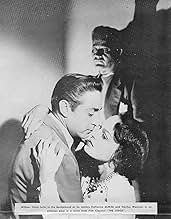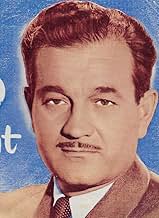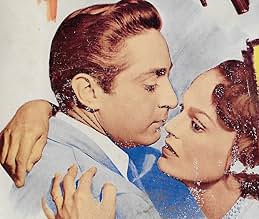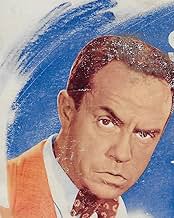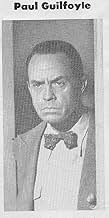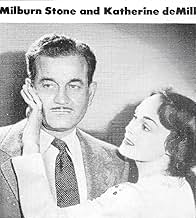Ajouter une intrigue dans votre langueA crooked lawyer blackmails a client into a murder plot against his wife.A crooked lawyer blackmails a client into a murder plot against his wife.A crooked lawyer blackmails a client into a murder plot against his wife.
Joseph Forte
- District Attorney
- (as Joe Forte)
Jess Kirkpatrick
- Patrolman Patrick Riley
- (as Jesse Kirkpatrick)
Al Rosman
- Crippled Victim
- (uncredited)
Avis en vedette
And also his last.... Yes, this scheme reminded me SO DARK THE NIGHT, where Steven Geray was a detective investigating on his own crime, the crime he commited himself. The story is not the same but the overall feeling for the audiences, who discover something unusual, different, is nearly the same. That's precisely what's interesting here, no cliché, nothing predictable. With Fritz Lang's BEYOND A REASONABLE DOUBT, the overall feeling for the audience is also close to this one; some court story so thrilling, exciting, because never seen before. Awesome ending too, to close a flat, bland director's career. Except his silent features. He died in anonymity.
At first I thought this was a sleeper in the making. Those early scenes of lunatic Tilton (Budd) are grabbers, especially when he challenges Code by shooting a crippled boy and his dog! Moreover, his contrast with ice cold lawyer Strang (Stone) sets up real character color. So it's no surprise when we find out about Strang's utter lack of legal ethics. But inside the cold exterior, the lawyer's suffering pangs of conscience over the rogues he's gotten off. At the same time, his arrogant wife is two-timing him with his associate, the county doctor, of all people. Thus, despite his rigid demeanor, Strang's not altogether unsympathetic nor unconflicted. Also, director Clifton heightens this first half with some imaginative camera angles and close-ups suggesting a world where anything might happen.
Trouble is the second half bogs down in a lot of talk minus the earlier visual novelties. Though loaded with potential tension, the Russian roulette scene goes on too long and is drained by too much exposition, resulting in an action climax largely wasted. Then too, Strang's motivations behind his murder scheme are muddied up with all the talk that's not helped by an abrupt dream sequence. In short, the promising early part is undone by a awkward latter part. All in all, the movie raises interesting ideas but fails to effectively develop them.
(In passing—For fans of TV's Gunsmoke (1955-1975), it's enlightening to catch actor Stone playing a role opposite to his avuncular Doc Adams in TV's longest running western. However, if he smiled even once as lawyer Strang, I missed it. Anyway, a salute to that fine actor.)
Trouble is the second half bogs down in a lot of talk minus the earlier visual novelties. Though loaded with potential tension, the Russian roulette scene goes on too long and is drained by too much exposition, resulting in an action climax largely wasted. Then too, Strang's motivations behind his murder scheme are muddied up with all the talk that's not helped by an abrupt dream sequence. In short, the promising early part is undone by a awkward latter part. All in all, the movie raises interesting ideas but fails to effectively develop them.
(In passing—For fans of TV's Gunsmoke (1955-1975), it's enlightening to catch actor Stone playing a role opposite to his avuncular Doc Adams in TV's longest running western. However, if he smiled even once as lawyer Strang, I missed it. Anyway, a salute to that fine actor.)
One of the last films directed by the great Elmer Clifton, whose career dates back to the mid-teens and D.W.Griffith, The Judge was also the first production of Ida Lupino's production company, first called Emerald Productions, later called The Filmmakers.
This is a quirky film which is both hard-boiled and pretentious, raw and artsy. It is also a film that raises as many questions as it answers. Elements are introduced into the story, covered in detail, and then not developed. Dream sequences are introduced, but are unclear. The main character--who is a sleazy defense attorney, NOT a judge--is well-played by Milburn Stone, but his story is not really typical of anyone other than this one oddball character. Why the film is called THE JUDGE, I don't know. The show begins and ends with a judge pulling out a file from his file cabinet, and talking about what a unique and disturbing case this was. The same judge does rule on an important case in the film, but he is not central--one wonders why the film is not called THE DEFENSE ATTORNEY? While star Milburn Stone and some of the supporting actors give good performances, the doctor and Stone's wife are both amateurishly played. Also, no scored instrumental music is feature in the film: only avant-garde acapella choral music, and the wire recording of the violin practicing that is used to get the psycho killer to grab a gun, which is used later as supporting music. This gives the film an art-film feel. A few scenes were unclear and required me to rewind the tape and watch them two or three times. The scene where the guy selling the dolls picks someone's pocket--the guy who later kills a policeman and is blackmailed by Stone--was unclear. Where was that gun coming from? Is this sloppy continuity, or an attempt at being ambiguous? Who knows... When the film ends, somewhat abruptly I might add, the viewer will probably have a number of questions as we did. However, whatever minor flaws I may complain about, The Judge is a unique film experience. Not entirely successful, but unique nonetheless.
This is a quirky film which is both hard-boiled and pretentious, raw and artsy. It is also a film that raises as many questions as it answers. Elements are introduced into the story, covered in detail, and then not developed. Dream sequences are introduced, but are unclear. The main character--who is a sleazy defense attorney, NOT a judge--is well-played by Milburn Stone, but his story is not really typical of anyone other than this one oddball character. Why the film is called THE JUDGE, I don't know. The show begins and ends with a judge pulling out a file from his file cabinet, and talking about what a unique and disturbing case this was. The same judge does rule on an important case in the film, but he is not central--one wonders why the film is not called THE DEFENSE ATTORNEY? While star Milburn Stone and some of the supporting actors give good performances, the doctor and Stone's wife are both amateurishly played. Also, no scored instrumental music is feature in the film: only avant-garde acapella choral music, and the wire recording of the violin practicing that is used to get the psycho killer to grab a gun, which is used later as supporting music. This gives the film an art-film feel. A few scenes were unclear and required me to rewind the tape and watch them two or three times. The scene where the guy selling the dolls picks someone's pocket--the guy who later kills a policeman and is blackmailed by Stone--was unclear. Where was that gun coming from? Is this sloppy continuity, or an attempt at being ambiguous? Who knows... When the film ends, somewhat abruptly I might add, the viewer will probably have a number of questions as we did. However, whatever minor flaws I may complain about, The Judge is a unique film experience. Not entirely successful, but unique nonetheless.
The Judge is Jonathan Hale, who narrates this heavy-handed story about how defense attorney Milburn Stone gets Paul Guilfoyle off of a charge of murdering a police officer -- temporarily -- so he can play a game of Russian Roulette with him. It's a psychological drama, in which Stone and Guilfoyle are quite mad, for differing reasons
Elmer Clifton cowrote and directed this movie, and his long career in the movies explain the melodramatic rendering. They do not particularly explain the score by Gene Lanham, which consists of a choral effect, which tries to add gravitas to the goings-on. Everyone takes the performance very seriously, and while it may be all right, considering the anger which many people hold defense lawyers in, I found it fairly laughable, despite a good cast which includes Katherine Demille and everyone's favorite Perry White, John Hamilton.
Elmer Clifton cowrote and directed this movie, and his long career in the movies explain the melodramatic rendering. They do not particularly explain the score by Gene Lanham, which consists of a choral effect, which tries to add gravitas to the goings-on. Everyone takes the performance very seriously, and while it may be all right, considering the anger which many people hold defense lawyers in, I found it fairly laughable, despite a good cast which includes Katherine Demille and everyone's favorite Perry White, John Hamilton.
I can't say too much about this film, "The Judge" from 1949. I saw a horrendous print, and I admit I found the story strange.
The movie stars Milburn Stone of Gunsmoke fame. I only know him from Gunsmoke, and I doubt I saw one episode all the way through. He plays attorney Martin Strang, known for taking high-profile cases and winning.
When he learns his wife is cheating on him, he comes up with a way to exact revenge. He approaches a cop killer, William Jackson (Paul Guilfoyle) and takes his case pro bono. However, he exacts a promise from Jackson, if he gets him off, he will ask for a favor in return.
Strang uses a loophole in the law so that Jackson's case is dismissed - temporarily. Jackson will not be indicted for killing a member of law enforcement, but he will be going down for murder. Before Jackson actually realizes this, Strang calls in the favor.
The rest was ridiculous and in fact, as is usual with a lousy script, the narrator had to explain the whole thing at the end. The only interesting thing to me was that the actor Stanley Waxman, who played Mrs. Strang's love interest, looked like Tyrone Power from a distance. The shape of the face, the hairline, the eyebrows. Up close he didn't look like him at all.
I am working off of a list of noirs. I have seen all of the famous ones. The rest of them have been a little disappointing. This was one.
The movie stars Milburn Stone of Gunsmoke fame. I only know him from Gunsmoke, and I doubt I saw one episode all the way through. He plays attorney Martin Strang, known for taking high-profile cases and winning.
When he learns his wife is cheating on him, he comes up with a way to exact revenge. He approaches a cop killer, William Jackson (Paul Guilfoyle) and takes his case pro bono. However, he exacts a promise from Jackson, if he gets him off, he will ask for a favor in return.
Strang uses a loophole in the law so that Jackson's case is dismissed - temporarily. Jackson will not be indicted for killing a member of law enforcement, but he will be going down for murder. Before Jackson actually realizes this, Strang calls in the favor.
The rest was ridiculous and in fact, as is usual with a lousy script, the narrator had to explain the whole thing at the end. The only interesting thing to me was that the actor Stanley Waxman, who played Mrs. Strang's love interest, looked like Tyrone Power from a distance. The shape of the face, the hairline, the eyebrows. Up close he didn't look like him at all.
I am working off of a list of noirs. I have seen all of the famous ones. The rest of them have been a little disappointing. This was one.
Le saviez-vous
- AnecdotesDespite what the narrator say, it is the jury that decides the fate of the defendant and in this case "freed" the defendant. The attorney did not free him, the attorney merely defended him.
Meilleurs choix
Connectez-vous pour évaluer et surveiller les recommandations personnalisées
Détails
- Date de sortie
- Pays d’origine
- Site officiel
- Langue
- Aussi connu sous le nom de
- The Gamblers
- Lieux de tournage
- société de production
- Consultez plus de crédits d'entreprise sur IMDbPro
- Durée1 heure 9 minutes
- Couleur
- Rapport de forme
- 1.37 : 1
Contribuer à cette page
Suggérer une modification ou ajouter du contenu manquant

Lacune principale
By what name was The Judge (1949) officially released in Canada in English?
Répondre

